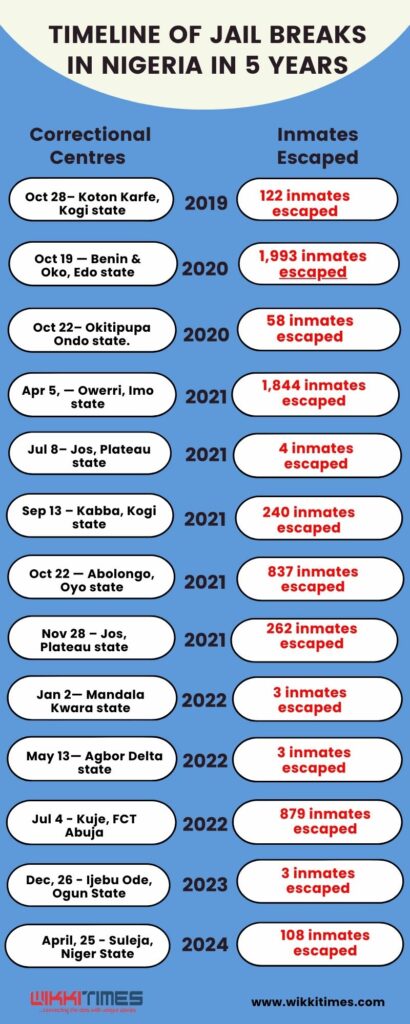From October 28, 2019, to April 25, 2024, no less than 6,356 inmates escaped from Nigerian Correctional Service Centres in a series of 13 successful jailbreaks.
Recently, Nigeria has been battling with a trend of persistent jailbreaks in its correctional centres, posing challenges to law enforcement and public safety efforts.
These incidents have raised serious concerns about the effectiveness of security measures within the country’s prison system and also highlighted the need for reforms.
With high-profile inmates escaping and returning to society, often with grave implications for public security, addressing the root causes behind these jailbreaks has become a pressing priority for authorities.
JAILBREAKS TIMELINE
On October 28, 2019, following torrential rain, flooding breached the Koton Karfe Correctional Centre in Kogi State, leading to the escape of 122 inmates.

On October 19, 2020, there was a jailbreak at Benin and Oko Prisons, Edo State during the #EndSARS protests, where hoodlums attacked the centre leading to jailbreaks that enabled 1,993 inmates to escape.
Similarly, on October 22, 2020 – Okitipupa Correctional Centre, Ondo State: As violence erupted during the #EndSARS protests, hoodlums stormed Okitipupa Correctional Centre, freeing 58 inmates by tearing down the facility’s fence.
April 5, 2021 — Owerri Correctional Centre, Imo State: Gunmen launch a coordinated attack on Owerri Correctional Centre and the police command headquarters, allowing 1,844 inmates to escape amidst allegations of involvement by the Eastern Security Network.
July 8, 2021 – Jos Custodial Centre, Plateau State: Four suspects awaiting trial for kidnapping and armed robbery escape from Jos Custodial Centre due to reported personnel negligence.
September 13, 2021 – Kabba Correctional Centre, Kogi State: Gunmen attack Kabba Correctional Centre, killing two security operatives and facilitating the escape of 240 inmates, with 114 later re-arrested.
October 22, 2021 — Abolongo Medium Security Custodial Centre, Oyo State: Gunmen armed with sophisticated weapons attack Abolongo Custodial Centre, resulting in the escape of 837 inmates, with 262 recaptured shortly after.
ovember 28, 2021 – Jos Correctional Centre, Plateau State: Gunmen invade Jos Correctional Centre, leading to the escape of 262 inmates.
January 2, 2022 — Mandala Prison, Ilorin, Kwara State: Three inmates escape from Mandala Prison.
May 13, 2022 — Agbor Prison, Delta State: Three inmates flee after heavy rainfall causes the northern perimeter wall of Agbor Prison to collapse, prompting the deployment of correctional guards, army, and police officials to recapture them.
Gov. Diri Grants Amnesty To Nine Inmates Of Correctional Centre In Bayelsa
December 26, 2023 – Ijebu Ode Correctional Centre, Ogun State: Three inmates escape from Ijebu Ode Correctional Centre.
April 25, 2024 – Suleja Jailbreak, Niger State: 108 inmates escape in the latest jailbreak incident in Suleja, Niger State.
IMPLICATIONS
Observers often express dismay over the absence of Closed-Circuit Television (CCTV) devices at centres, especially the Kuje Prison. “Having inspected the facility, it’s disappointing that there are no CCTV cameras, which could have provided vital surveillance,” for Senate President, Ahmad Lawal said. Others suggested that this breakdown in security has contributed to an increase in prison breaks, kidnappings, and banditry nationwide.
But former Minister of Interior, Rauf Aregbesola, lamented the inability of security forces to defend the centres. “Despite the presence of a well-equipped platoon from the Nigerian Army, the Police Force, NSCDC officers, and armed Correctional Service personnel, the defence was ineffective,” he remarked. “Kuje is heavily fortified, but this breach raises concerns about our security protocols.”
Nigeria’s correctional centres are characterised by congestion mostly as a result of delays in case proceedings and proper maintenance of the facilities.
The frequency of jailbreaks underscores the inefficiency of Nigeria’s security structure and the appointed officials’ credibility, in addition to providing more questions on the transparency in the implementation of the funds budgeted for Nigeria’s internal security.
Experts noted that the dire implications of these escapes are serious, as criminals return to society, posing a threat to public safety. These individuals will continue to operate conspiratorially without swift action, perpetuating more crimes.
The Ministry of Interior was allocated N461.99 billion in the 2024 budget. This includes N321.33 billion proposed for personnel expenses, overhead N41.22 billion, and N99.45 billion for capital expenditure.




